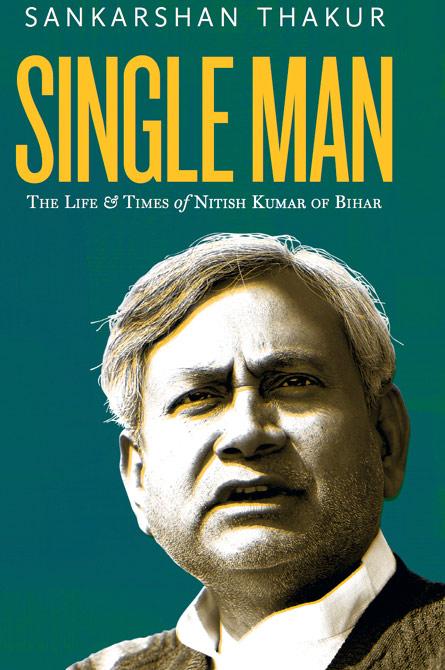
'I do not think Nitish has ever had any illusions that he could ever give Narendra Modi the run for the prime ministership.'
'What he did think, and continues to think, is that by breaking away and aligning with other forces, he can attempt to stop Narendra Modi from becoming prime minister of India.'
'That is the primary goal he has set himself, and to pursue that I think it is critical that he remains the main political force in Bihar,' says Sankarshan Thakur, whose latest book Single Man is based on the life and times of Bihar Chief Minister Nitish Kumar.
Half-way into his second term, Nitish Kumar would step out of Bihar and take a high-risk gamble to torpedo Narendra Modi's bid to become prime minister of India. He would call his Gujarat counterpart a divisive fascist, a man who threatened the foundations of pluralist India.
Modi was a man he was not prepared to work with, he would fight him. Nitish knew just what a huge risk he was embarking on, but it was not a risk he would flinch from taking: "Is aadmi ke saath koicompromise nahin hoga, is se hamaare sambhaav ko khatra hai. (There shall be no compromise with this man, he threatens our inclusive way of life).
In the process of unveiling that grandiloquent clash of ideas with Narendra Modi, Nitish would lose an old ally and earn himself a belligerent adversary.
-- from the Single Man
Sankarshan Thakur's new book is an extremely engaging account of the challenges, dilemmas and setbacks of one of the most interesting and intriguing politicians in recent India.
Bihar Chief Minister Nitish Kumar is known to be risk-averse and may well suffer for his decision of breaking away from the Bharatiya Janata Party, but his ideological dare is deserving of appreciation, feels Thakur, the Patna-born Roving Editor of The Telegraph newspaper, who comes armed with an impressive reputation of long years of reporting from Bihar.
Both his books, have been on Bihar's leading men -- Laloo Yadav and Nitish Kumar -- politicians who began their journeys in the same party, but drew apart and dominated the state for almost two-and-a-half decades.
Single Man tells the story of Bihar under Nitish Kumar, woven with interesting reportage told by one of the best voices from the state.
Sankarshan Thakur, recently back from the Patna Literary Festival, spoke to Rediff.com's Archana Masih via e-mail about how Nitish never could realise to what depths Laloo would plunge Bihar to; the reasons why he has lost his sheen in his second term and how the bitter unravelling of his 17-year partnership with the BJP has brought him eyeball to eyeball with the most daunting challenge of his life.
As someone who has written books on both Nitish Kumar and Laloo Yadav, men you refer to as 'two of Bihar's great sons who embossed the state with their imprint' and further say that 'Laloo is critical to understanding Nitish', what do you see as their respective imprints on Bihar?
Both men, when they arrived on the scene as chief executives of Bihar, bore great promise and were invested with immense and all-round public faith.
Laloo Yadav frittered that faith away, displayed no will to govern or to make Bihar a better place. On the contrary, he became a populist messiah.
He did give a sense of pride to Bihar's backward and underprivileged communities, but did not move beyond that. And when the fodder scam allegations broke, he caged himself in the trappings of power, installing his wife Rabri Devi as proxy chief minister.
The meaning of empowerment, under Laloo, became keeping himself empowered.
Nitish, on the other hand, focused on governance and administration from the very start, reviving institutions of State, inspiring the bureaucracy to work, setting a clear work-oriented agenda.
So while Laloo's contribution was to bring an underprivileged constituency to fore and give it a stake in political power, Nitish took that a step beyond and began governing with the support of more or less the same power base.
You mention how Nitish Kumar assisted Laloo Yadav to gain leadership of the Bihar Opposition in 1989, and the chief ministership a year later because 'there was no other choice at that time.'
How much does that decision hound him -- looking at the damage that 15 years of Laloo-Rabri rule did to Bihar and its institutions?
Oh, hugely. I suspect Nitish never could realise at that time what depths Laloo would plunge Bihar to.
To this day, Nitish maintains that despite having supported Laloo in his initial days, he never thought him to be a man of any vision.
Having said that, Nitish must partly take the blame for pushing Laloo to the foreground.
Please ...
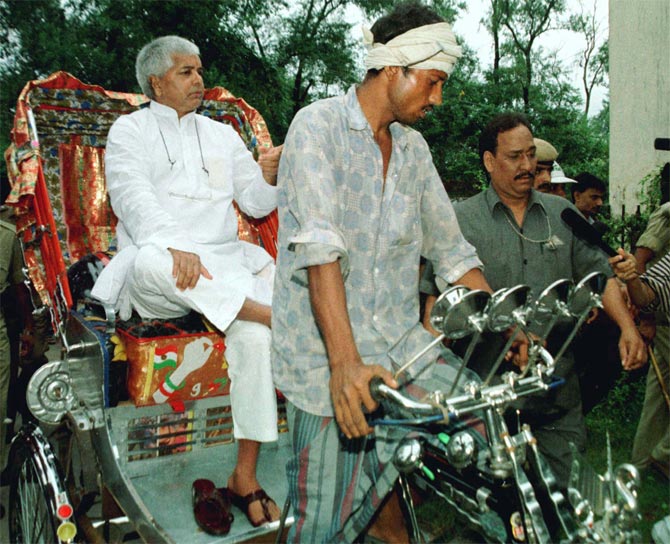
For men who began their political journeys together, is there any similarity left between them or are they on completely contrary paths?
From your book one gets the impression that that they haven't spoken to each other in years!
The two men are chalk and cheese. That will become clear to anyone who cares to read Single Man. They were thrown up by the same anti-Emergency upsurge of the mid-1970s and they belonged to the same anti-Congress, Lohiaite school of politics.
But by social background, by personal nature and inclination, by what they wanted to do with politics and political power, they were, and remain, entirely divergent men.
As I have said somewhere in my book, they are a fracture of the same bone, but a fracture.
Unlike the 2009 election which were fought between a strong Janata Dal-United-BJP alliance, led by Nitish Kumar, and a fractured Opposition, the scene has changed since the JD-U snapped its 17-year alliance with the BJP.
In the face of a resurgent Laloo and the latest opinion polls showing a dismal performance by the JD-U -- is the good run over for Nitish Kumar?
I tend to disagree with the proposition that Laloo has become resurgent. What he may benefit from, though, is the break up of the JD-U and BJP alliance, and to that extent your question is just.
Laloo has always benefitted from the low index of unity against him and the fact that the JD-U and the BJP will contest the next election separately offers Laloo the opportunity to exploit that divide.
Having said that, I think it is early yet to begin making predictions about electoral prospects in Bihar this summer. It promises to be an extremely engrossing multi-cornered contest, but who will run away with the prize, if at all, is tough to predict.
Will the 2014 result impact the Bihar assembly polls in 2015?
It may well do. As I maintain, the 2014 verdict is tough to predict at the moment and as a reporter, I do not consider it my calling to make predictions. That job I leave to soothsayers and pollsters.
What I can best do it to travel the road and give a sense of the drift of winds. Often the direction of winds is clear and discernible, often they blow in contrary directions.
Telling those drifts as clearly as I possibly can is what I have done as a reporter.
Even so, I will have to say that should Nitish do poorly in the 2104 Lok Sabha election, retaining his minority government in Bihar will become a tough undertaking.
2015 is yet a long, long way off.
Please ...
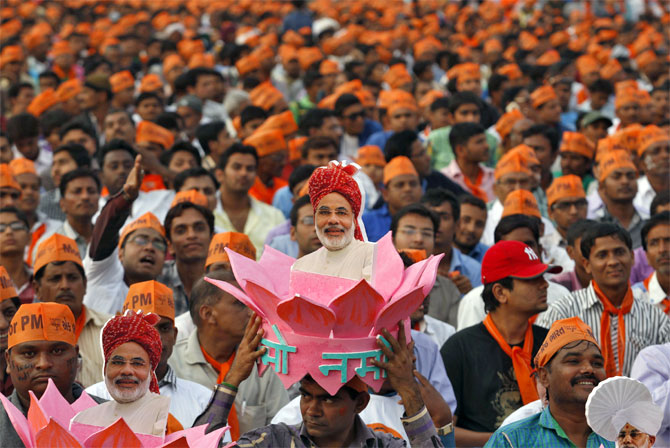
Your book also brings out how Nitish Kumar is risk-averse, how he avoids confrontation -- yet he took a huge risk by ending his alliance with the BJP.
With the BJP appearing as the front-runner in 2014, do you think in your understanding that somewhere he thinks that he floundered in this decision?
Like many thinking men, Nitish is a bundle of contradictions.
One of those contradictions is that though he is risk-averse and dithers on decisions, he does tend to take them when he thinks the time is ripe.
In breaking up with Laloo in 1994, and in severing ties with the BJP over Narendra Modi in 2013, Nitish lingered and deliberated. But in the end he cut the knot.
It is easy, I believe, to pass judgement on critical political decisions. As journalists we do that all too often and easily. It is much more difficult to be in the shoes of the one who has to take those decisions.
Nitish's decision to break on the Narendra Modi issue was an ideological and, to my mind, a brave one.
I believe he was well aware he was making things difficult for himself by casting the BJP away.
He lost a comfortable majority in the Bihar assembly, and, in the process, also earned himself a belligerent and surging adversary.
But he took that decision all the same because he believes Narendra Modi's politics to be destructive and opposed to the larger idea of an inclusive and secular India.
He may well suffer for his decision, but his ideological dare is deserving of appreciation.
He could have kept Laloo out and continued his vision for Bihar by not breaking the alliance. He, after all, did not break away from the NDA (Nitish Kumar was a minister in the National Democratic Alliance government) after the Gujarat riots?
I will explain this to you, as I have in the book. In Nitish's world, there are moments when he sees principal contradictions and acts in accordance with trying to sort them out for himself.
Remember, this is all for himself and in the interest of pursuing what he sees as his goals.
In 2002, when the Gujarat violence happened and Nitish refused to quit the NDA, he saw ridding Bihar of Laloo as the principal contradiction.
He wanted to wrest Bihar from Laloo at any cost and he knew the BJP was the only ally that could help him do that.
More recently, the prime ministerial candidacy of Narendra Modi has become to him the principal contradiction in politics.
He sees Modi as a man who imperils inclusive and secular India and so he believes opposing him and his politics is critical.
Yet, did his ending the alliance also show that after a long time a politician was willing to take that risk for a principle?
In the time of pepper sprays in Parliament, where politics in India has mostly become about vote banks, not beliefs or issues -- was this a leader who had the courage of his conviction?
I think your sense is right. It seems to have become a popularly believed wisdom that Nitish's decision to break with the BJP is opportunistic and ambition-driven.
Both those ways of looking at it are erroneous. If anything, Nitish has suffered for taking that decision.
He forsook a two-thirds majority in the Bihar assembly, he earned himself a bitter ally, he chose to go it alone.
I somehow cannot see the opportunism and ambition in this. Nitish is an astute and thinking politician. I do not think he has ever had any illusions that with a regional outfit like the JD-U and with his mean resources, he could ever give Narendra Modi the run for the prime ministership.
What he did think, and continues to think, is that by breaking away and aligning with other forces, he can attempt to stop Narendra Modi from becoming the prime minister of India.
That is the primary goal he has set himself, and to pursue that I think it is critical that he remains the main political force in Bihar. That is going to be the real challenge for him.
Please ...
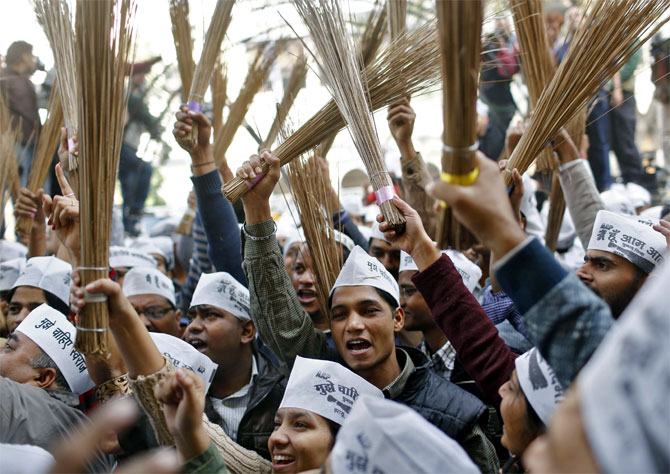
Your book is called Single Man, perhaps apt for a man who has remained Bihar's lone trigger for change. You write about how the change in Bihar has remained a narrative about Nitish and has not become the narrative of Bihar.
Isn't this also true about most other chief ministers? The same could be said of Raman Singh, Shivraj Chouhan, Naveen Patnaik or Narendra Modi.
That could be so, I am really not equipped to talk about other chief ministers you name at any depth. But the title of my book, which has become the subject of some charming speculation already, is inspired by many reasons and facets. I would leave that for the reader to find out.
Sometimes, isn't a Single Man who is a doer, better than having several power centres?
Again, I am not sure. I think it is important for leaders to be decisive. But in a democracy like ours, it is equally important for leaders to consult and build consensus.
Another important issue relates to party and organisation building.
Too many of our political entities revolve around individuals or a set of individuals and I think that is not healthy.
I see that already happening with the fledgling AAP (Aam Aadmi Party) as well. Arvind Kejriwal is already become a cult figure around who everything is beginning to revolve.
Leaders should be able to build institutions and leave a legacy behind. Sadly, that does not happen too often.
The legacy they tend to leave behind is the legacy of family inheritors.
Nitish does not even have a family inheritor. That is good for him, but bad for those who subscribe to and work for the JD-U.
Nitish Kumar comes across as an extremely private man. Your book reveals how he and his late wife lived apart -- he consumed by his political life, and you mention how his son lives almost recluse-like in one part of his official residence -- how much of what makes its way into the book is known to Nitish Kumar?
I have no notion of that, at least yet. He knew all along I was writing a book on him. He was good to grant me time over the last couple of years.
But he himself was always reluctant to speak about his personal life, he maintained he preferred talking about his politics and worldview, which was fair enough.
He never enquired what I was writing, what I was not. Single Man is not an authorised or approved biography, I assert all rights over it and take all responsibility.
Has Nitish Kumar read the book? What does he think of it? What was his response when you first told him that you would be writing a book on him?
I have no idea. I do know, though, that he is a copious reader, newspapers in the mornings, books at night. But I have no notion if he has read Single Man yet. I hope he does some day.
Please ...
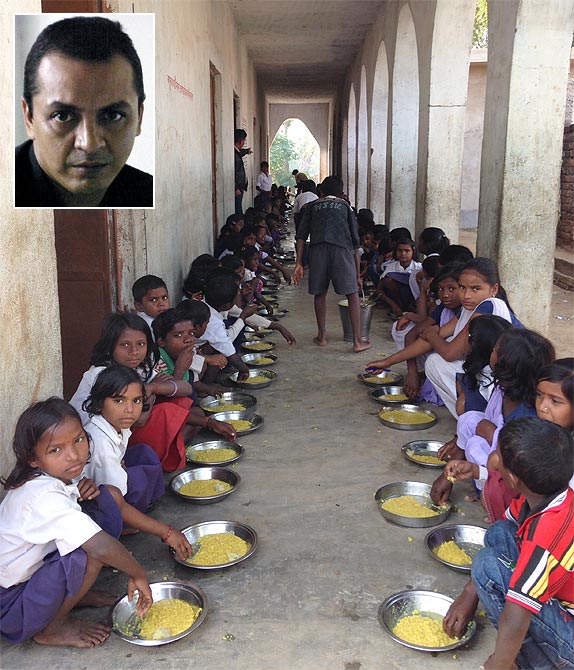
Your book is also a reportage on Bihar, where you mention the time when Bahubalis ruled, the breakdown of law and order, the disappearance of the State -- what are the chances of Bihar returning to that inglorious time? Or is it difficult to reverse the trend that has been started by Nitish?
That, again, is tough to say. I think Bihar has just begun to emerge from its monumental deficits, not merely economy or infrastructure related, but also social and psychological.
It is a hard and brittle place at the same time. Things that have been done and be quickly undone. Which is why hope and apprehension co-exist in me as a Bihari.
You will get a sense from the book, I hope, of how jagged and uneven the story of Bihar's recovery is and what a long distance it has to go yet.
What are the pressures of writing books on powerful politicians?
I take none, so there is no opportunity for anyone to put pressure. My only stakes in journalism and writing are journalism and writing.
You also mention how the sheen has come off Nitish Kumar in the second term and the criticism of over-reliance on the bureaucracy, corruption, deterioration in law and order etc. Do you see this as anti-incumbency sentiment or did he set the bar too high in the first term?
It is a bit of both, and Nitish Kumar must begin to pay attention. Nitish can no longer take comfort from being compared favourably to the Laloo era, he has had two terms, he has raised expectations, now he must be tested against them.
I am nobody to offer him advice, he is a keen politician and I think he knows what he needs to do to safeguard, first of all, his own turf.
Whether he is able to do that or not is a function of time.
Where did Nitish Kumar go wrong in the second term? What is it that he should have done differently?
Too many things, I think the answer lies in your previous question and the answer I offered to it. I sense sometimes a complacency. I sense a reluctance in him to accept criticism. I sense also, at times, a denial.
D P Tripathi of the NCP (Nationalist Congress Party), a long-time admirer of Nitish Kumar and a very fine observer of politics, has put all of this very succinctly in a small conversation with me towards the end of Single Man.
Why could Nitish Kumar not capitalise on Laloo's conviction in the fodder scam to his advantage? How did Laloo come out appearing stronger from prison than before he entered the Birsa Munda jail?
A lot of politics in our country, and especially in the so-called Hindi heartland, is still about caste equations to the exclusion of all other factors.
Laloo has managed to retain his core caste base all these years, which is why he remains relevant. His conviction gave his image a blow, and guillotined any chance of his contesting elections.
But, unfortunately, very little of such deficits in our leaders has come to impact how they fare politically.
Run your eye up and down the country and you will probably have a better answer.
How do you see the Nitish Kumar-Narendra Modi relations pan out post Election 2014?
There is a saying in olde English: Chance would be a fine thing.